We are living in interesting times.
The media is full of mixed messages about what’s ahead for us economically and what we can expect in our real estate markets.
Yet there’s plenty of good news out there if you care to look for it – an economy that is the envy of most developed nations; a sound banking system and a stable political system; jobs growth; rising consumer sentiment; population growth; and a nation that’s getting wealthier.
So let’s look at some of these macroeconomic factors in light of what could be ahead for our property markets in 2016.
But before we do let me give a little warning…
Our property markets are more fragmented than I’ve seen in a long time, with different states, different price points and different types of properties behaving very differently.
Factors affecting our housing markets in 2016
Don’t get me wrong, it won’t all be rosy this year.
Consumer confidence is fickle and this is likely to have a negative impact on our property markets.
We’ll keep hearing negative news about the world’s problems, including China’s economy slowing down, the European economy being a basket case, deflation around the world, terrorism and wars.
At the same time our local political scene is concerning many Australians.
And with a federal election around the corner, some people will put their property plans on hold.
However, there are also plenty of positive factors that will underpin our property markets including:
- Interest rates are likely to remain at historic lows throughout 2016 and it’s quite possible we’ll have another fall in official interest rates;
- Strong population growth will continuein our capital cities, albeit at a lower rate than in previous years (probably around 1.4% per annum). According to the Australian Bureau of Statistics, our population currently increases by one person every 1 minute and 31 seconds. This projection is based on an estimated one birth every 1 minute and 44 seconds, one death every 3 minutes and 24 seconds and a net gain of one international migration every 2 minutes and 39 seconds. Of course many of these new people want to live in the same four big capital cities (and in particular in Melbourne and Sydney where many of the jobs are), which means demand is likely to outstrip supply in our inner and middle ring suburbs;
- Ongoing confidence in our property markets,which continue to perform solidly in most of our capital cities. This year many homeowners and investors will try and get a foothold on the property ladder before prices increase further or borrowing conditions turn less favourable;
- Overseas investorswill keep looking for a safe haven for their money and continue investing in Australian property. The low Australia dollar is likely to encourage overseas investors to keep ploughing their money into new and off the plan high-rise apartments in our capital cities at a time when we already have an oversupply of this type of property;
- The wealth effect(particularly in Melbourne and Sydney) will kick in with existing property owners feeling better off as the value of their homes have risen significantly over the last few years. Some will use this extra equity to move home or invest in real estate; and
- An improving local economy that is performing better than most economists forecast.
Here are nine reasons for optimism for 2016 and beyond.
1. The bad news around the world is subsiding.
While the world’s problems haven’t gone away, many of the fears that plagued us over the last few years are subsiding:
- The US economy is slowly picking up, but one of the X-Factors will be the upcoming presidential election, including the possibility of Donald Trump as President;
- China’s economy has not collapsed as some scaremongers were suggesting. Sure it’s weakening and has plenty of problems ahead, but India’s economy is powering ahead and this will be good for Australia;
- Europe will remain a basket case for years and now it has geo-political problems to contend with. However, it seems the Eurozone economy is through its worst; and
- The IMF projects global economic growth will pick up. It currently stands at 3.1%, and is projected to increase to 3.4% in 2016 and 3.6% in 2017.
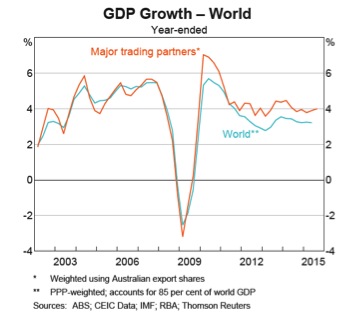 2. Australia’s economy is in good shape
2. Australia’s economy is in good shape
Only last week the Australian Bureau of Statistics reported real Gross Domestic Product (GDP) growth recorded a more upbeat than expected 3.0% growth in 2015.
This was helped by both government and consumer spending.
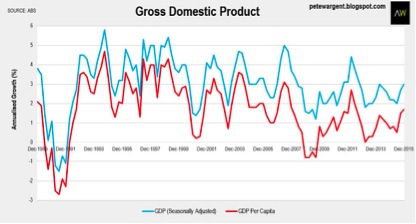 3. Unemployment is under control
3. Unemployment is under control
We’re creating more jobs. Most of these jobs are in the services industry and many are part-time. Unemployment levels didn’t rise to the levels many predicted and when people have more job security they are more confident and likely to spend their money. This helps the economy (and our property markets) go round.

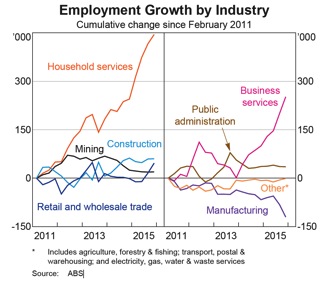 4. Consumer confidence is fickle, but positive
4. Consumer confidence is fickle, but positive
Consumer sentiment remains fickle but is generally more positive than a year ago.
When people feel comfortable about their jobs, their more positive outlook is good for confidence, good for consumption and good for investment.
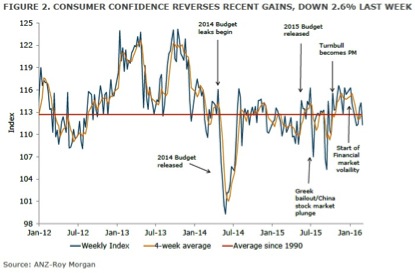 5. Australia’s inflation rate is low
5. Australia’s inflation rate is low
Our low inflation rate gives the Reserve Bank room to keep interest rates low or contemplate reducing them further if needed to further stimulate our economy.
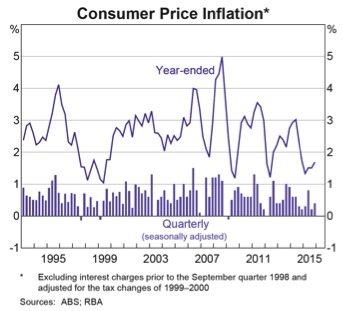 6. Interest rates are low and likely to remain so for a while
6. Interest rates are low and likely to remain so for a while
Low interest rates are allowing homeowners to pay off their mortgages faster and give some who have over committed some extra breathing space.
Looking forward, the money markets suggest rates could remain low for up to a decade.
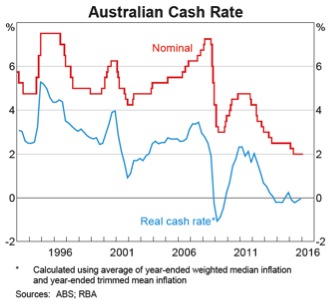 7. Household finances are in sound shape.
7. Household finances are in sound shape.
Figures from the ABS show Australian household wealth climbed in the past year.
There has been a strong wealth effect for households from rising real estate prices, but we’ve been good savers stashing our cash, reducing our debts and taking advantage of low interest rates to pay off our home loans over the last few years.

However, more recently, Australians have been dipping into their saving to consume and, of course, this is one of the factors that has propped up our economy.
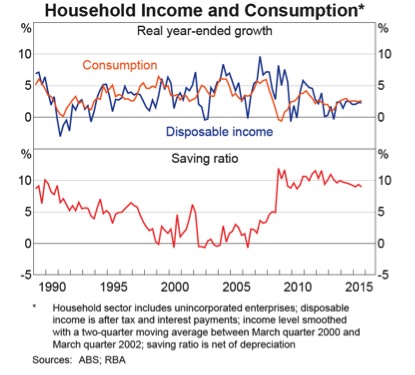 8. Housing affordability is not as bad as some make out
8. Housing affordability is not as bad as some make out
Sure house prices are expensive, but recently in the Australian Financial Review respected economist Chris Joye cited Bank of America Merrill Lynch’s Dr. Alex Joiner, who has demonstrated that if you take the median house price in 1985 and adjust it only by disposable household income growth between 1985 and 2015 and the change in borrowing capacity over this period – via lower mortgage rates – you find the 1985-adjusted value is 1% above current median prices.
So the change in incomes and interest rates since 1985 implies that Australian housing is fairly valued or actually slightly cheap.
This analysis is crucially predicated on interest rates staying at or below their present marks and if interest rates rise, then housing could be considered expensive. However, the bond market currently implies that over the next 10 years the cash rate will only climb by about half a percentage point.
9. Our property markets will surprise on the upside
We’ll see lower capital growth this year than last year but according to Corelogic capital city dwelling values increased by 0.5% in February, and the trend in annual growth has moderated over the past seven months, from 11.1% down to 7.6%.

Of course there is no one property market and some areas will still languish over the year, while a mixture of low interest rates, population growth, job stability and relative affordability will make more people get involved in property this year.
Some will just renovate or improve their homes. Others will take the next step and upgrade to new or bigger homes.
More first home buyers will get a foot on the property ladder pushed by low interest rates and banks chasing for their business.
And investors looking to prepare for the next stage of the property cycle will take advantage of the opportunities the property market is offering them.
Michael Yardney is a director of Metropole Property Strategists, which creates wealth for its clients through independent, unbiased property advice and advocacy. He is a best-selling author, one of Australia’s leading experts in wealth creation through property and writes the Property Update blog.
 2. Australia’s economy is in good shape
2. Australia’s economy is in good shape 3. Unemployment is under control
3. Unemployment is under control 4. Consumer confidence is fickle, but positive
4. Consumer confidence is fickle, but positive 5. Australia’s inflation rate is low
5. Australia’s inflation rate is low 6. Interest rates are low and likely to remain so for a while
6. Interest rates are low and likely to remain so for a while 7. Household finances are in sound shape.
7. Household finances are in sound shape. 8. Housing affordability is not as bad as some make out
8. Housing affordability is not as bad as some make out

COMMENTS
SmartCompany is committed to hosting lively discussions. Help us keep the conversation useful, interesting and welcoming. We aim to publish comments quickly in the interest of promoting robust conversation, but we’re a small team and we deploy filters to protect against legal risk. Occasionally your comment may be held up while it is being reviewed, but we’re working as fast as we can to keep the conversation rolling.
The SmartCompany comment section is members-only content. Please subscribe to leave a comment.
The SmartCompany comment section is members-only content. Please login to leave a comment.